Comments
WIMBLEDON: An immense Alcaraz, but the changing of the guard is yet to come…
Alcaraz’s merits compared with Djokovic’s demerits. Just a bad day among many so-so days for the Serbian, nonetheless No. 2 of the ATP ranking? Or is it the start of an inexorable decline? Farewell to the Grand Slam, but will he win more Majors?
Published
1 year agoon
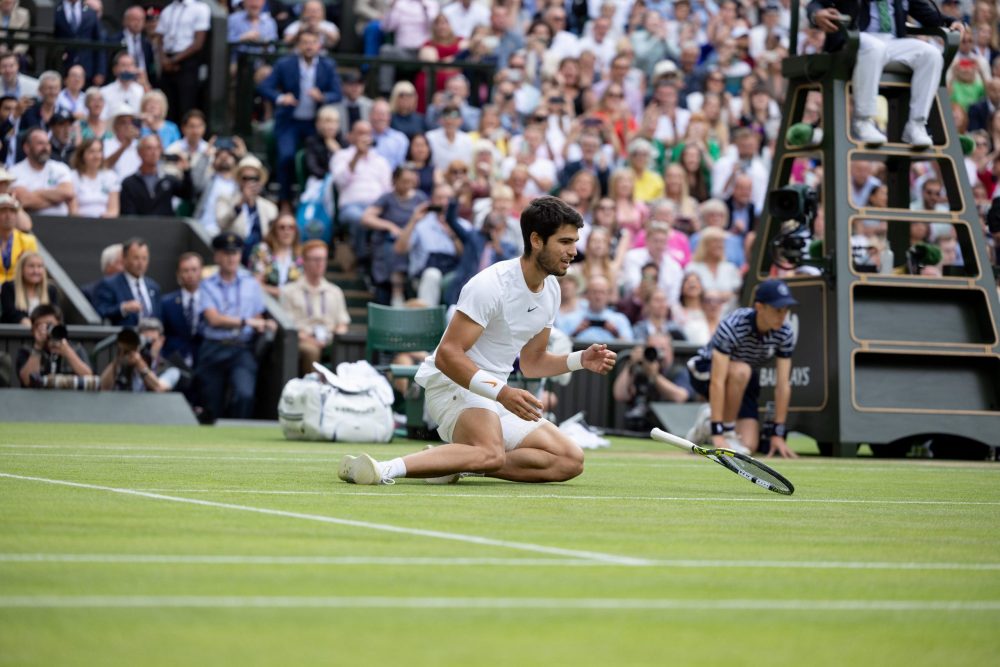
NOTE: This article was written in Italian and has been Translated by Carla Montaruli
Carlitos Alcaraz triumphed, cheers for Carlitos Alcaraz. The feat he accomplished at only 20 years of age and in his fourth tournament on grass is remarkable, remarkable indeed. He is the third youngest champion ever after 17-year-old Becker and 20-year-old Borg, as well as the third Spaniard after Santana and Nadal to win the trophy. Being able to beat a player in the fifth set after 4 hours and 43 minutes who is the king of marathons, a seven-time champion and had won 45 straight matches over the last 10 years on Centre Court, can only be considered a great exploit.
Credit where credit is due. Alcaraz played beautiful tennis, complete in all aspects, bold forehands and backhands, powerful and hit on the rise, drop-shots, acrobatic and diving volleys, hanging smashes, aces and winning serves. All this with great mental solidity displayed throughout the entire match: after losing the first set badly, enduring the tension of a second set tiebreak which had not started well for him, then dominating the third set and finally closing the encounter as a consummate veteran in the fifth with a last service game played brilliantly after tenaciously defending very well the break he had secured in the third game of the final set.
A 20-year-old young man could not be asked for more. A well-deserved applause and congratulations also for defending that first place in the world rankings that he will hold for the twenty-ninth week, hoping to keep it as long as possible.
Staying at the top for 389 weeks like the extraordinary champion he beat on Sunday would mean dominating the world stage for over seven years. Over seven years! And…as I write this I wonder if we have paid enough attention to such a feat in all that time!
Yes, because you write 310 weeks, Federer’s weeks as world No.1, then you write 389, that is Djokovic’s weeks spent in the same spot: there and then they seem like just numbers…but only when you divide them by 52, the weeks in a year, do you realize the immensity of these extended dominances within a sport whose growing competitiveness and many booming young guns are emphasized almost every day.
Crazy.
Crazy in the case of both Federer and Djokovic with the ATP scepter in their hands, because each of them – as the fourth part of the Fab Four – had to confront at least with the other three. All four have been world number one. Still, for 699 weeks, almost 13 years and a half, Roger and Nole were number one, Nadal was king for 209 weeks and Murray for 41. Add them up and that’s another five years—eighteen years of reign for four kings. Written so many times off the top of my head…but upon reflection this is impressive stuff. It never remotely happened before.
So here it is… the idea that Carlitos Alcaraz could one day – but we are talking about seven years! – reach Djokovic’s 389-week reign today may seem unreal, absolutely far-fetched.
But…are there perhaps three more champions on the horizon who can recreate a quartet of phenomena like the Fab Four? I don’t see them at all. Will Alcaraz be alone in the driver’s seat for the next few years?
In seven years, 10 or 18 – 18 years was the reign of the Fab Four — phenoms could sprout up almost like mushrooms! Speculating on what will happen in such a long and far away period is a mindless divertissement and I don’t know why it dawned on me…. Except perhaps Holger Rune today – though greatly downgraded by the last duel here at Wimbledon – there doesn’t seem to be a rival of Alcaraz’s caliber right now. Our compatriots may see our Sinner two steps below Alcaraz and one step below Rune, but neither do they see other “prospects” ahead of him. Djokovic called Sinner one of the leaders of the new generation. His fifth place in the Race, along with eighth in ATP ranking certify such status.
But then for a year or two, or maybe even three, if Rune and Sinner don’t make giant strides, or if a new rising star doesn’t emerge, Carlitos Alcaraz could easily add a hundred or more weeks to the 29 he has already earned as No. 1.
Or am I venturing into a wild prediction?
Just not to present you with a single scenario I want to say, however, that the most obvious commonplace one could come up with today, after this final that Djokovic shall not cease to regret for at least four reasons – three missed backhands in the tiebreak and a clumsy drive volley which squandered a hard-earned break point for a 2-0 lead in the decider – is that we have witnessed the changing of the guard.
It will make so many headlines, sure. I may have uttered it too, in one of the many videos I did for Ubi Instagram, for Ubitennis, and the IntesaSanPaolo website. But in my opinion, it’s not true yet.
Djokovic is not ready to retire. He is not going to quit, even if the dream of achieving a Grand Slam has vanished, maybe forever. Farewell to Grand Slam, but will he win more Majors? I think so. He is still world No. 2, isn’t he?
I had written throughout the tournament – you may check – that I didn’t think I had seen the best Djokovic. He had not been at his best against Hurkacz or even Rublev. And, as much as many readers disagreed, neither had he dominated Sinner as he had last year in the last three sets when he had been truly unplayable. Demerit to him and credit to Sinner, as often happens simultaneously.
I wrote that Hurkacz had thrown the first set out of the window and when leading 5-4 in the tiebreak of the second with two serves at disposal to put it away he had not been faultless but had shown a lack of personality. I also wrote that Rublev had been unlucky in the fourth set on the occasion of some break points he had failed to convert.
We did not see the best Djokovic, in my opinion, even in the final against Alcaraz. Otherwise, he would have been two sets up.
Oh yes, come on: the three backhand errors he made in the first tiebreak he lost after 15 won were not errors from Djokovic, the champion who has always played the crucial pointsbetter than anyone else, certainly better than Federer and Murray, perhaps equal to Nadal.. In particular, match points aside – what about that, dear Roger? – those tiebreaks that are said to be worth double.
Those three backhands, a drop shot at 3-2 when he was a minibreak ahead, the one at 6-5 and setpoint after he had deftly returned Carlitos’ serve, the one at 6-6 were errors worthy of a Hurkacz, a Norrie or a Shapovalov, not a Djokovic!
I recall – just quoting from memory because I haven’t time to engage in dutiful and thorough research – that Nole’s record in best-of-five matches after winning the first set is monstrous. Imagine after winning the first two sets.
Here, a Nole in ordinary form, even against that very inspired Alcaraz, would have started the third set with a two-set lead.
I know that with ifs and buts, you don’t go anywhere. But I’m pretty sure – and I think Nole is too – that if the two sets lead never came into being, it was more because of Nole’s demerit than Carlitos’ merit.
But is this a random demerit, due to a bad day and a series of bad days as it appeared to me throughout the tournament, or is it a sign of the slow inexorable decline of the Serbian who is beginning to come to terms with his age? That drive volley with which he dissipated the all-important break point and the chance to rise 2-0 in the fifth set was another topical moment. Yet, it was not Novak to succeed in a decisive breakthrough, but Carlos three minutes later.
The fury with which, at the changeover, Nole smashed his racket on the net post is revealing. Nole had missed the train to victory and, experienced as he is, he understood it.
I would say that this casual contingent demerit or signal of inexorable decline is the discriminating point of our debate.
Bravo, bravo to Alcaraz for taking advantage of it with precocious maturity, but did Djokovic stumble over a mediocre day by chance, because it can happen to everyone, even to younger tennis players, or because even he – an extraordinary phenomenon – is on that rickety path where age starts taking its toll?
If the most plausible answer we believe in is the first one – and that is the one I believe in – we cannot yet speak of a changing of the guard.
Djokovic can safely return to the throne of tennis, perhaps win the US Open and/or the next ATP Finals in Turin as well as an 11th Australian Open. Push the undoubtedly great Alcaraz back to second place.
If, on the other hand, the right answer is the second, this Wimbledon definitely enshrines the changing of the guard. But, even in this scenario, only the changing of the guard at the top and the handover between Djokovic and Alcaraz. Not a generational changing of the guard though, at least for now and the very near future, because even a subdued and slightly tarnished Djokovic is stronger than Rune, Sinner, and Tsitsipas on almost any surface. At worst he would be the second-best tennis player in the world. The others, Sinner included, would do anything to stand where he stands.
You may like
-


Novak Djokovic’s Potential Second Round Clash With Rafael Nadal Headlines Olympics Draw
-


Motivation, Pressure And Expectations – Novak Djokovic Targets History At Wimbledon
-


Carlos Alcaraz And Novak Djokovic Wouldn’t Yield To Medvedev And Musetti At Wimbledon
-


Novak Djokovic Claims 375th Major Win To Reach Wimbledon Final
-


Carlos Alcaraz Beats Fiery Medvedev To Reach Second Wimbledon Final
-


(VIDEO) Novak Djokovic Continues To Impress Despite Crowd Arguments
Comments
Roland Garros 2024: Has Crowd Noise Reached Boiling Point Or Is It Hyperbole?
Daniil Medvedev was one of the players who commented on the debate surrounding the Roland Garros crowd.
Published
2 months agoon
30/05/2024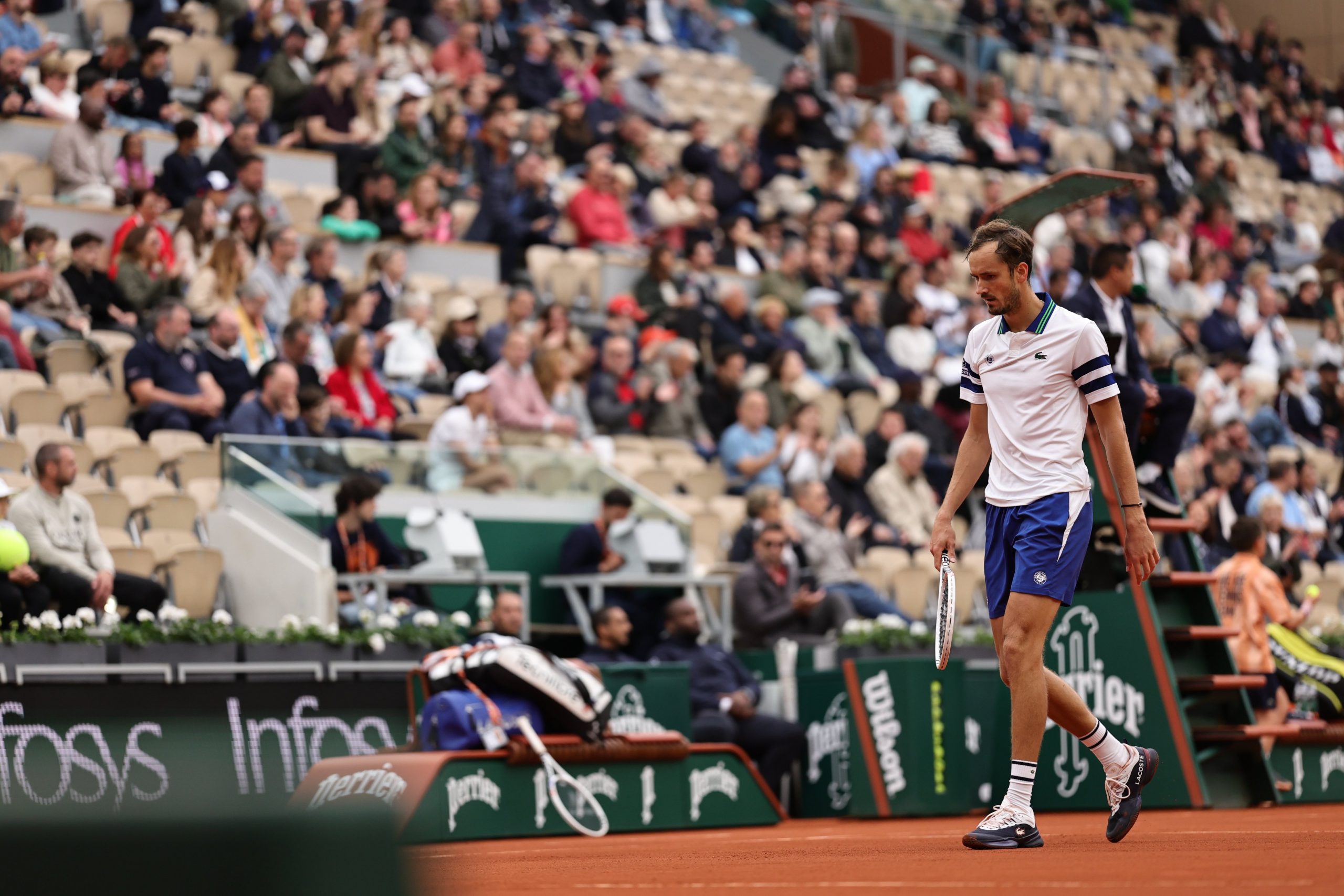
Roland Garros has often been a place with energetic crowds that have been involved in plenty of controversial moments but has it reached boiling point this year?
The Roland Garros have been involved in lots of heated moments over the years whether it’s been finals involving Novak Djokovic, whether it’s been that epic Garbine Muguruza against Kristina Mladenovic clash or any Alize Cornet or Gael Monfils match.
The French crowd isn’t afraid to show its true feelings as it’s been one of the most passionate atmosphere’s in the world.
However there has been debate in the past as to whether the crowd has been bordering on the edge of being disrespectful.
That debate has boiled over at this year’s event as it all started when David Goffin claimed the crowd on Court 14 spat gum in his direction during his five set win over Giovanni Mpetshi Perricard.
Furthermore Iga Swiatek was pleading with the crowd in her on-court interview to remain silent during the point as they were seen shouting during a volley.
This kind of behaviour from the crowd as well as the retaliation from the players has seen tournament director Amelie Mauresmo see stricter rules being enforced by security and umpires on both sides.
So has this issue reached boiling point or is this an over exaggeration? Well here is what some of the players think.
Paula Badosa
“I think she (Swiatek) cannot complain, because I played Court 8 and 9 and you can hear everything. Like, I can hear Suzanne Lenglen, Philippe Chatrier, Court 6, 7 during the points.
“I think she’s very lucky she can play all the time on Philippe Chatrier and she’s okay with that. But I don’t mind. As I said, I played in small courts these days, and I was hearing so much noise. In that moment, I’m just so focused on myself and on my match that it doesn’t really bother me.
“Honestly, I like when the fans cheer and all this. I think I get pumped. Look, we had a very tough situation years ago when we were playing without fans with the COVID situation, so now, for me, I’m so happy they’re back and I think they’re very important for our sport.”
Grigor Dimitrov
“I think us as tennis players we’re very particular with certain things, and I always say one is the background. For example, let’s say if it’s too bright or if you have, let’s say, big letters, whatever it is, it’s a bit more difficult.
“Also, with the crowd, if you see the crowd moving in the back, it’s very, very tough because we are so focused on the ball. When we see that is moving, automatically your eye is catching that. On the movement part, I’m all for being absolutely still.
“Now, with the sound, there’s not much, I guess, we can do. I think either/or I’m very neutral on that, to be honest. I could play, I don’t know, with music on and all that. Of course, I prefer when everything is, like, a little bit more tame, so to speak, but this is a little bit out of our control.”
Daniil Medvedev
“I think it’s very tough, because there are two ways. So right now, in a way, there are, like, the kind of, I would say, unofficial rule — or actually an official rule, don’t interrupt players before second serve and when they’re ready to serve and during the point. Personally, I like it. Because I think, I don’t know if there are other sports than tennis and golf that have it, but because it’s so technical and, like, I would say every millimeter of a movement you change, the ball is going to go different side.
“So, you know, if someone screams in your ear, your serve, you could double fault. That’s as easy as that. That’s not good. At the other side, if there would be no this rule and it would be allowed all the time, I think we would get used to it. Now what happens is that 95% of matches, tournaments, it’s quiet. And then when suddenly you come to Roland Garros and it’s not, it disturbs you, and it’s a Grand Slam so you get more stress and it’s not easy.
“Yeah, I think playing French in Roland Garros is not easy. That’s for sure. I think a lot of players experience it. I would say that in US Open and Wimbledon is not the same. Australia can be tough. I played Thanasi once there on the small court. It was, whew, brutal. Yeah, I think, you know, it’s a tough question. I think as I just responded, it’s good to have energy between points, but then when you’re ready to serve, it’s okay, let’s finish it and let’s play tennis. Same before first and second serve. And then when there is a changeover, when there is between points, go unleash yourself fully, it’s okay.
“But again, when you’re already bouncing the ball, you want to get ready for the serve, if it would be 10 years we would be playing loud, we would not care. But for the moment it’s not like this so when you get ready for serve, you want to toss the ball, then suddenly ten people continue screaming, the serves are not easy, so for the moment, let’s try to be quiet.”
Conclusion
In conclusion, this year’s crowd has been more volatile and aggressive then seen in previous years which is a big problem for player safety.
However on a whole the crowd is also more passionate and entertaining which makes for a quality product.
As long as the crowd can control their temperament then most of the incidents are nothing but hyperbole and something the players need to get used to in a hostile Parisian environment.
Comments
Steve Flink: The 2024 Italian Open Was Filled with Surprises
Published
2 months agoon
20/05/2024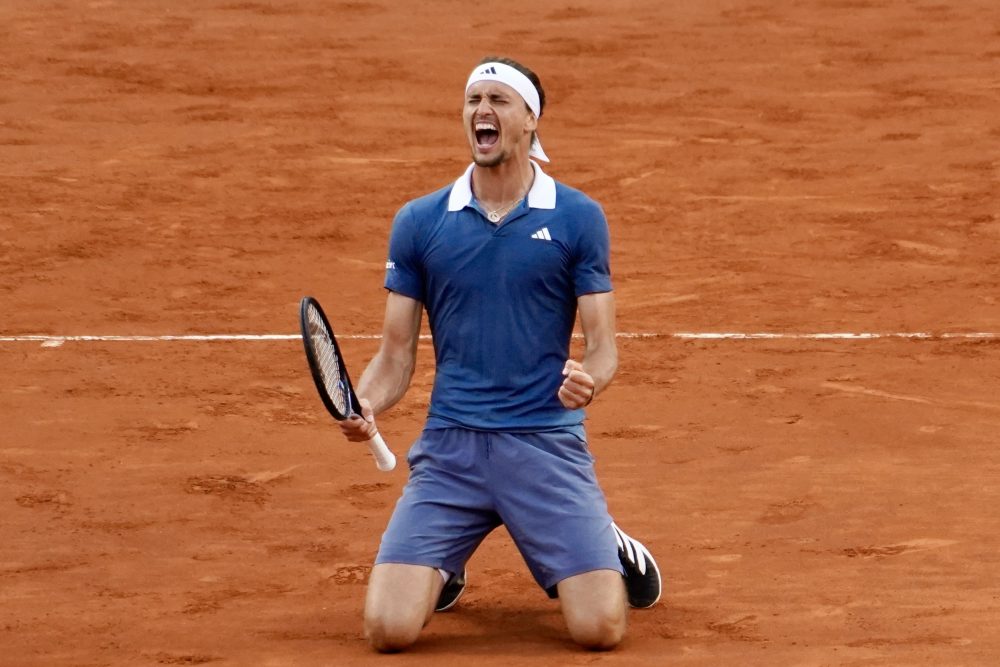
In sweeping majestically to his sixth career Masters 1000 title along with a second crown at the Italian Open in Rome, Germany’s Sascha Zverev put on one of the most self assured performances of his career to cast aside the Chilean Nicolas Jarry 6-4, 7-5 in the final. By virtue of securing his 22nd career ATP Tour title and his first of 2024, Zverev has moved from No. 5 up to No. 4 in the world. That could be crucial to his cause when he moves on to Roland Garros as the French Open favorite in the eyes of some experts.
Zverev is long overdue to win a major title for the first time in his storied career. Not only has he won those six tournaments at the elite 1000 level, but twice— in 2018 and 2021—he has triumphed at the prestigious, year end ATP Finals reserved solely for the top eight players in the world. This triumph on the red clay of Rome is a serious step forward for the 27-year-old who has demonstrably been as prodigious on clay as he is on hard courts.
Seldom if ever have I seen a more supreme display of serving in a final round skirmish on clay than what Zverev displayed against Jarry on this occasion. He never faced a break point and was not even pushed to deuce. Altogether, Zverev took 44 of his 49 service points across the two sets in his eleven service games. He won 20 of 21 points on his deadly delivery in the first set and 24 of 28 in the second. He poured in 80% of his first serves and managed half a dozen aces and countless service winners. His power, precision and directional deception was extraordinary.
Although the scoreline in this confrontation looks somewhat close, that was not the case at all. Jarry was thoroughly outplayed by Zverev from the backcourt, and despite some stellar serving of his own sporadically, he could not maintain a sufficiently high level. He did manage to win 78% of his first serve points, but Jarry was down at 35% on second serve points won. In the final analysis, this was a final round appointment that was ultimately a showcase for the greatness of Zverev more than anything else. Jarry was too often akin to a spectator at his own match as Zverev clinically took him apart.
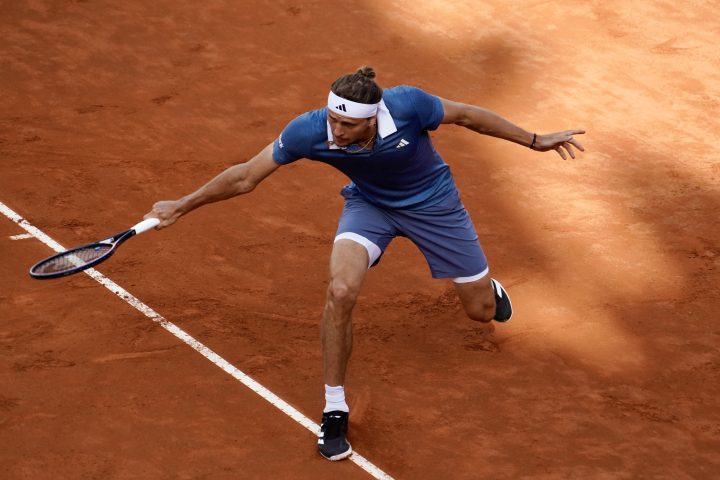
Zverev and Jarry arrived in the final contrastingly. The German’s journey to the title round was relatively straightforward. After a first round bye, he handled world No. 70 Aleksandar Vukic. Zverev dismissed the Australian 6-0, 6-4. The No. 3 seed next accounted for Italy’s Luciano Darderi 7-6 (3), 6-2. In the round of 16, Zverev comfortably disposed of Portugal’s Nuno Borges, ousting the world No. 53 by scores of 6-2, 7-5. Perhaps Zverev’s finest match prior to the final was a 6-4, 6-3 quarterfinal dissection of Taylor Fritz, a much improved player on clay this season. Zverev did not face a break point in taking apart the 26-year-old 6-4, 6-3 with almost regal authority from the backcourt.
Only in the penultimate round was Zverev stretched to his limits. Confronting the gifted Alejandro Tabilo of Chile, he was outplayed decidedly in the first set against the left-hander. The second set of their semifinal was on serve all the way, and the outcome was settled in a tie-break. With Tabilo apprehensive because he was on the verge of reaching the most important final of his career, Zverev was locked in. After commencing that sequence with a double fault, Zverev fell behind 0-2 but hardly put a foot out of line thereafter.
He did not miss a first serve after the double fault and his ground game was unerring. Zverev took that tie-break deservedly 7-4, and never looked back, winning 16 of 19 service points, breaking an imploding Tabilo twice, and coming through 1-6, 7-6 (4), 6-2. Zverev displayed considerable poise under pressure late in the second set to move past a man who had produced a startling third round upset of top seeded Novak Djokovic.
As for Jarry, the dynamic Chilean had a first round bye as well, and then advanced 6-2, 7-6 (6) over the Italian Matteo Arnaldi. Taking on another Italian in the third round, Jarry survived an arduous duel with Stefano Napolitano 6-2, 4-6, 6-4. He then cast aside the Frenchman Alexandre Muller 7-5, 6-3.
Around the corner, trouble loomed. Jarry had to fight ferociously to defeat No. 6 seed Stefanos Tsitsipas, who had by then established himself in the eyes of most astute observers as the tournament favorite. Tsitsipas has been revitalized since securing a third crown in Monte Carlo several in April. And in his round of 16 encounter, the Greek competitor had looked nothing less than stupendous in routing the Australian Alex de Minaur 6-1, 6-2.
Unsurprisingly, Tsitsipas seemed in command against Jarry in their stirring quarterfinal. He won the first set and had two big openings in the second. Jarry served at 3-3, 0-40. Tsitsipas missed a lob off the backhand by inches on the first break point before Jarry unleashed an ace followed by a service winner. The Chilean climbed out of that corner and got the hold. Then, at 5-5, Tsitsipas reached double break point at 15-40 but once more he was unable to convert. He got a bad bounce on the first break point that caused him to miss a forehand from mid-court. On the second, Jarry’s forehand down the line was simply too good.
Now serving at 5-6, Tsitsipas had not yet been broken across two sets. One more hold would have taken him into a tie-break and given him a good chance to close the account. But Tsitsipas won only one point in that twelfth game and a determined Jarry sealed the set 7-5.
Nonetheless, Tsitsipas moved out in front 2-1 in the third set, breaking serve in the third game. Jarry broke right back. Later, Tsitsipas served to stay in then match at 4-5 in that final set. He fought off three match points but a bold and unrelenting Jarry came through on the fourth to win 3-6, 7-5, 6-4. That set the stage for a semifinal between Jarry and a surging Tommy Paul, fresh from back to back upset wins over Daniil Medvedev and Hubert Hurkacz.
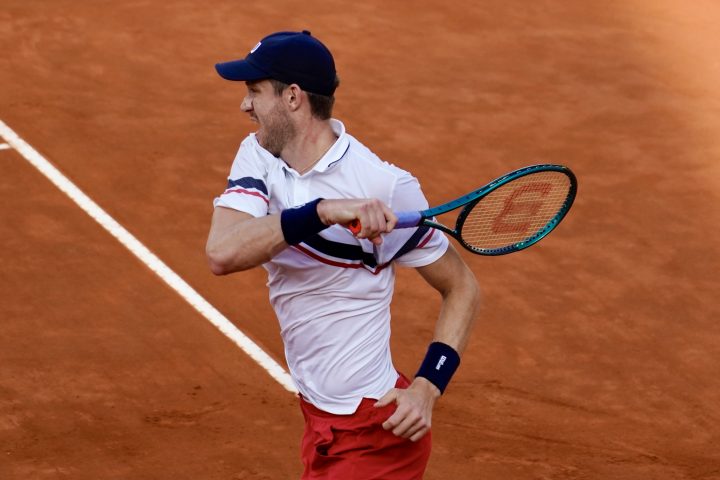
Jarry and Paul put on a sparkling show. Jarry took the opening set in 42 minutes, gaining the crucial service break for 5-3 and serving it out at 15 with an ace out wide. When Jarry built a 4-2 second set lead, he seemed well on his way to a straight sets triumph. But Paul had broken the big serving Hurkacz no fewer than seven times in the quarters. He is a first rate returner. The American broke back for 4-4 against Jarry and prevailed deservedly in a second set tie-break 7-3 after establishing a 4-0 lead.
Briefly, the momentum was with Paul. But not for long. Jarry saved a break point with an overhead winner at 2-2 in the final set, broke Paul in the next game, and swiftly moved on to 5-2. At 5-3, he served for the match and reached 40-0. But he missed a difficult forehand pass on the first match point and Paul then released a backhand down the line winner and a crosscourt backhand that clipped the baseline and provoked a mistake from Jarry.
The Chilean cracked an ace to garner a fourth match point, only to net a backhand down the line volley that he well could have made. A resolute Paul then advanced to break point but Jarry connected with a potent first serve to set up a forehand winner. The American forged a second break point opportunity but Jarry erased that one with a scorching inside in forehand that was unanswerable. Another ace brought Jarry to match point for the fifth time, and this one went his way as Paul rolled a forehand long. Jarry was victorious 6-3, 6-7 (3), 6-3.
Meanwhile, while all of the attention was ultimately focussed on the two finalists, it was on the first weekend of the tournament that the two dominant Italian Open champions of the past twenty years were both ushered out of the tournament unceremoniously. First, Rafael Nadal, the ten-time champion in Rome, was beaten 6-1, 6-3 in the third round by Hurkacz as he competed in his third clay court tournament since coming back in April at Barcelona.
He had lost his second round match in Barcelona to De Minaur. In his next outing at Madrid, Nadal avenged that loss to the Australian and managed to win three matches altogether before he was blasted off the court by the big serving and explosive groundstrokes of Jiri Lehecka. In Rome, the Spaniard won one match before his contest with Hurkacz. The first two games of that showdown lasted 27 minutes. Nadal had five break points in the opening game and Hurkacz had two in the second game. Neither man broke and so it was 1-1.
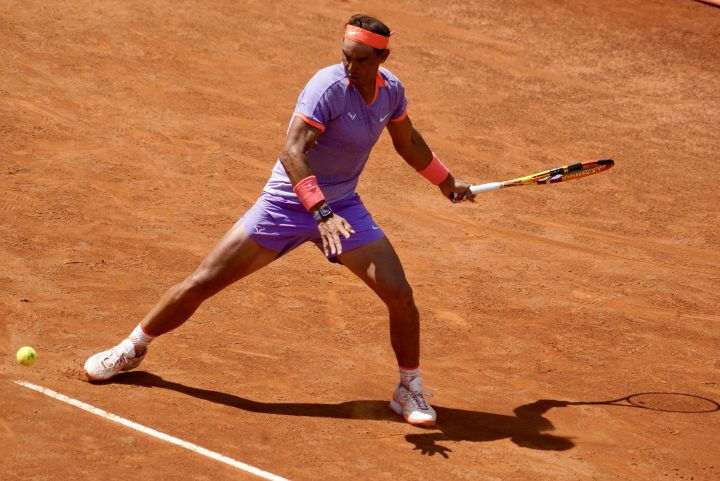
A hard fought and long encounter seemed almost inevitable, but the Polish 27-year-old swept five games in a row to take that first set, saving two more break points in the seventh game. He was mixing up his ground game beautifully, hitting high trajectory shots to keep Nadal at bay and off balance, then ripping flat shots to rush the Spaniard into errors. In the second set, Hurkacz broke early and completely outclassed Nadal. He also served him off the court, winning 16 of 17 points on his devastatingly effective delivery. With one more break at the end, Hurkacz surged to a 6-1, 6-3 triumph.
A day later, Djokovic, the six-time Italian Open victor, met Tabilo in his third round contest. Djokovic had played well in his second round meeting against the Frenchman against Corentin Moutet to win 6-3, 6-1. But afterwards, Djokovic was hit in the head by a water bottle while signing autographs. He had the next day off but when he returned to play Tabilo, the Serbian was almost unrecognizable. Beaten 6-2, 6-3, Djokovic never even reached deuce on the Chilean’s serve. On top of that, Djokovic, broken four times in the match, double faulted on break point thrice including at set point down in the first set and when he was behind match point in the second. Tabilo was terrific off the ground and on serve, but Djokovic was listless, lacking in purpose and seemingly disoriented. Some astute observers including Jim Courier thought Djokovic might have suffered a concussion from the freakish water bottle incident, but he did tests back in Serbia which indicated that was not the case.
Now Djokovic has decided to give himself a chance— if all goes according to plan— to potentially play a string of much needed matches at the ATP 250 tournament in Geneva this week. All year long, he has played only 17 matches, winning 12 of those duels. But nine of those contests were at the beginning of the season in Australia. Since then, he has played only eight matches. On the clay, he went to the semifinals in Monte Carlo where he benefitted from four matches, but he skipped Madrid and hoped to find his form again in Rome.
Realizing that losing in the third round there left him not only lacking in match play but not up to par in terms of confidence as well, Djokovic will try to make amends in Geneva. A good showing in that clay court tournament— either winning the tournament or at least making the final—would send the Serbian into Roland Garros feeling much better about his chances to win the world’s premier clay court championship for the third time in four years and the fourth time overall in his career.
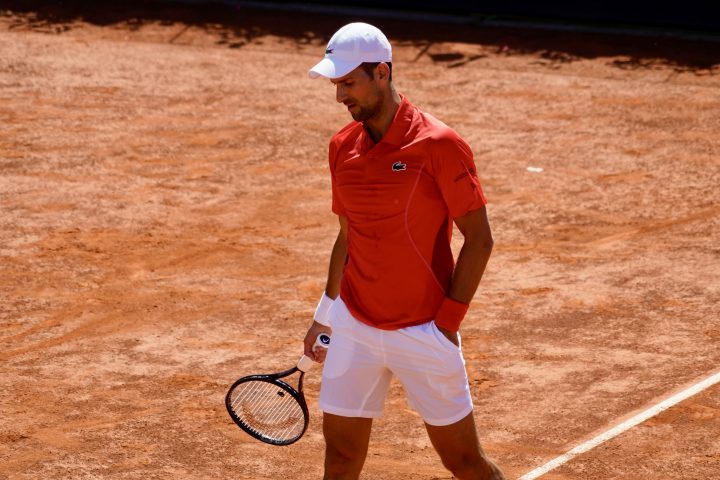
How do the other favorites stack up? It is awfully difficult to assess either Carlos Alcaraz or Jannik Sinner. Alcaraz missed Monte Carlo and Barcelona and probably rushed his return in Madrid, losing in the high altitude to Andrey Rublev in the quarterfinals. Then he was forced to miss Rome. He is clearly underprepared. As for Sinner, he played well in Monte Carlo before losing a semifinal to Tsitsipas. He advanced to the quarterfinals of Madrid but defaulted against Felix Auger-Aliassime with a hip injury.
Will Alcaraz and Sinner be back at full force in Paris? I have my doubts, but the fact remains that Sinner has been the best player in the world this year, capturing his first major in Melbourne at the Australian Open, adding titles in Rotterdam and Miami, and winning 28 of 30 matches over the course of the season. Alcaraz broke out of a long slump to defend his title at Indian Wells, but missing almost all of the clay court circuit en route to Rome has surely disrupted his rhythm.
I would make Zverev the slight favorite to win his first Grand Slam tournament at Roland Garros. If Djokovic can turn things around this week and rekindle his game, there is no reason he can’t succeed at Roland Garros again. I make him the second favorite. Out of respect for Alcaraz’s innate talent and unmistakable clay court comfort, I see him as the third most likely to succeed with Sinner close behind him. But that is assuming they are fit to play and fully ready to go.
Tsitsipas and Casper Ruud must be taken seriously as candidates for the title in Paris. Tsitsipas upended Medvedev and Zverev in 2021 to reach the Roland Garros final, and then found himself up two sets to love up against Djokovic before losing that hard fought battle in five sets. Ruud has been to the last two French Open finals, bowing against Nadal in 2022 and Djokovic a year ago. They started this clay court season magnificently, with Tsitsipas defeating Ruud in the Monte Carlo final and Ruud reversing that result in the final of Barcelona. Both men figure to be in the thick of things this time around at Roland Garros.
Where does Nadal fit into this picture? He will surely be more inspired at his home away from home than he was in his three other clay court tournaments leading up to Roland Garros, but it will take a monumental effort for the 14-time French Open victor to rule again this time around. With a decent draw, he could get to the round of 16 or perhaps the quarterfinals, but even that will be a hard task for him after all he has endured physically the last couple of years. Nadal turns 38 on June 3. If he somehow prevails once more in Paris, it would be the single most astonishing achievement of his sterling career.
The battle for clay court supremacy at Roland Garros will be fierce. The leading contenders will be highly motivated to find success. The defending champion will be in full pursuit of a 25th Grand Slam title. Inevitably, some gifted players will be ready to emerge, and others will be determined to reemerge. I am very much looking forward to watching it all unfold and discovering who will be the last man standing at the clay court capital of the world.
NOTE: All photos via Francesca Micheli/Ubitennis
Comments
Can Defensive Tennis Still Be A Success Story In Women’s Tennis?
Slam triumphs, top rankings: in just a few years we have witnessed the rise and fall of a certain way of playing tennis. So what’s really been happening? Kerber, Halep, and Wozniacki have been the latest successful performers of defensive gameplay.
Published
2 months agoon
13/05/2024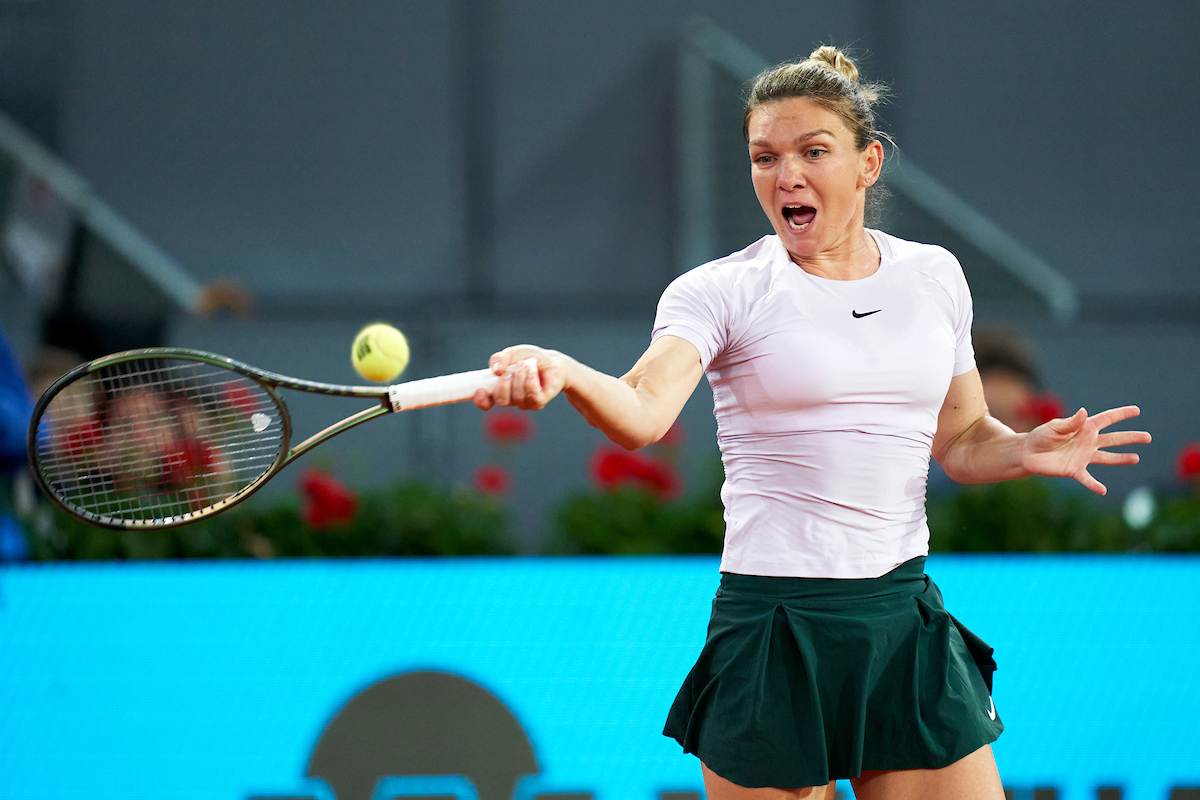
The last two WTA 1000 events, Miami and Madrid, whose final featured Danielle Collins vs. Elena Rybakina and Iga Swiatek vs. Aryna Sabalenka respectively, have confirmed a trend that in recent seasons seems more and more entrenched in the women’s tour: the prevalence of offensive tennis over defensive tennis.
Compared to a few years ago, things seem to have profoundly changed, to the point of almost being reversed. This does not mean that a certain type of “reactive” game has disappeared, nor that tennis based on the effectiveness of the defensive component has been scrapped. Yet, it is a matter of fact that players who rely predominantly on this approach struggle to break through and reach the top positions, unlike just a few years ago.
Before trying to identify the reasons for this phenomenon, it is necessary to verify whether the thesis is true. Here are some data. Below are the WTA rankings of the past years starting from 2015. I have highlighted in yellow the players who, in my opinion, can be associated with a defensive type of tennis.
A first comment on the 2015-17 period and the players I highlighted. Few doubts about Wozniacki, Kerber, Svitolina, and Errani. These are athletes who were never afraid of engaging in long rallies, and who often strove to turn the match into an endurance challenge, an arm wrestle over durability. It was not logical for them to seek quick and rushed points.
Including Simona Halep may seem less obvious. However, in my view, in her approach there prevails a tendency to rely on a “reaction” strategy, hitting back at her opponent’s choices; a counter-attack game, specular to an idea of pure aggressive tennis based on systematically and immediately getting the upper hand in rallies.
That is why I also highlighted Radwanska and Sevastova. In their case, it was mainly their lack of power that forced them to leverage their opponent’s power. As a result, hitting a winner could not be their first option. Winning points by eliciting errors from their opponent was far easier, simply by lengthening the rallies.
I was tempted to include Stephens and Kuznetsova as well, but in their case the matter is particularly complex because they are such eclectic players that they are difficult to confine to just one category. In fact, on the occasion of Sloane Stephens’ victory in the 2017 US Open, I decided to describe Stephens as “indefinable.”
Now let’s move on to the next three years, 2018 to 2020.
2018 represents the pinnacle of defensive tennis, with four of its icons at the top of the rankings and three more in the top 15. After all, 2018 is the year that sees Wozniacki win in Australia (defeating Halep in the final), Halep in Paris, and Kerber at Wimbledon. At the WTA Finals in Singapore, Elina Svitolina reaps the most prestigious title of her career.
If 2018 is to be considered the zenith of defensive tennis, since 2019 there has been quite a crushing decline, confirmed by the rankings of the last three years, 2021 to 2023.
Here follows a chart of the results in the Slams and WTA Finals from 2015 to 2024.
The final Top 10 ranking 2023 featured no player with a markedly defensive imprint. Daria Kasatkina was the only flagbearer holding on in the top 20. Players deploying aggressive tennis now seem to have taken the lead in operations.
Which are the causes that have led to the current scenario? I have identified three, which may also have been acting jointly.
1) Lack of generational turnover
One possible thesis is that the structural conditions of the women’s tour haven’t changed significantly, but that we are simply going through an episodic lack of generational turnover in defensive tennis. A temporary blackout which is bound to be overcome over time.
Wozniacki (born 1990) and Kerber (born 1988) were halted first by physical issues and then by maternity leave. Maternity also for Svitolina (born 1994), while Halep (born 1991) has been sidelined for almost two years by her doping case. In essence, all of the strongest defensive tennis players have disappeared from the top ranks due to factors unrelated to the court; somewhat prematurely, and that is also why there has not been time to find successors.
On the other hand, as of today, there are not many players aged under 30 on the horizon. I would mention Mertens (born 1995) and Kasatkina (born 1997). If we take into account that a possible alternative like Sorribes Tormo (best ranking 28) is 27, it’s quite hard to identify who can perpetuate defensive tennis.
2) Changed game conditions
For this second hypothesis, we are venturing along a complex and uneven path, which would require much more space for being addressed as it deserves. In short, the proposition holds that “slow” playing conditions favour defensive tennis, whereas “fast” playing conditions snugly fit with aggressive tennis. Should this hypothesis turn out to be grounded, organizers would simply have to decide to speed up or slow down the playing conditions and tables would be turned.
I recall the “very slow” 2018 WTA Finals in Singapore, won by Svitolina over Stephens. As far as I am concerned, I do not have such data to suggest that in recent years the playing conditions have been sped up, thus penalizing defensive players. Almost certainly the last Finals (Guadalajara, Forth Worth, and Cancun) were played in faster conditions than the previous editions held in Asia, but it is far more complicated to prove this for the Slams and other major tournaments.
I remember that when talking about playing conditions, not only the surface of the courts should be taken into account, but also the balls used (as well as humidity, altitude, etc). And for some essential data there no certainties, which means that the thesis is possible, but not provable.
3) Further growth of offensive players
Third hypothesis: in recent seasons new aggressive players who have risen to the very top have also enhanced the quality of their tennis, raising the bar to such heights which appear to be out of the reach of defensive players. Ultimately, offensive players have been making greater strides than defensive players.
I would say that such growth has manifested itself in two different directions. On the one hand, some players have further strengthened the offensive component, starting with the quality of their serve or and groundstrokes (as in the case of Rybakina and Sabalenka).
On the other, fewer “one-dimensional” tennis players have emerged. Currently we are seeing athletes who are comfortable not only when commanding the rally, but also when compelled to defend themselves. Let’s consider the latest year-end No. 1s: we went from Kerber/Halep (2016-18) to Barty/Swiatek (2019-2023). Well, both Barty and Swiatek were and are players capable of producing more wins than Angelique and Simona, but without going down when under pressure or scurrying and scrambling.
Wozniacki, Kerber, and Halep have relied on their great mobility and superior court coverage skills to reach the top. However, today No. 1 spot is held by a tennis player like Swiatek who, besides being a remarkable ball-striker, in terms of mobility is not at all inferior to Wozniacki & Co.
Indeed, my personal belief is that Iga is probably the best-moving tennis player since Steffi Graf. Maybe not yet when moving forward, but at least horizontally, off her right and left wing. In fact, as well as being endowed with a superlative rapidity and responsiveness, Swiatek possesses phenomenal coordination skills. A gift that enables her to organize her swing in very few moments, even if she is called upon to execute it at the end of a sprint or lunge, perhaps sliding. This means that those players who rely mainly on defensive skills are likely to find themselves lacking sufficient weapons to face an opponent with such qualities.
Conclusions
This is the current situation. What about the future? Since I do not possess a magic crystal ball, I do not feel like reciting a “de profundis” for defensive tennis. Things could change, especially in the long term.
In the short term, there is still the possibility that the “senior” players will be able to retrieve their best levels. After all, already last year at Wimbledon Svitolina was able to reach the semifinals after ousting Swiatek in the quarters. And probably if she had managed to defeat Vondrousova in the semifinals, in my opinion, she would have had very good chances against Jabeur, considering their records in finals (Ons 5 won and 8 lost, Elina 17 won and 5 lost).
Before being halted by Vondrousova, Svitolina had appeared as full of conviction, recharged by her maternity break. Which brings us back to the mental component, which can sometimes prove to be the extra weapon, capable of overshadowing physical-technical aspects. If a defensive player endowed with an exceptional killer instinct were to burst into the WTA tour, quite different scenarios might open up.
Translated by Carla Montaruli

Paris Olympics Daily Preview: Osaka Plays Kerber, Nadal Teams with Alcaraz

Tennis At The 2024 Paris Olympics: Five Things You Need To Know

Rafael Nadal’s Double Olympic Bid In Doubt, Confirms Coach Moya

Matteo Berrettini extends his winning streak to eight consecutive matches to reach the semifinal in Kitzbuehl

Novak Djokovic’s Potential Second Round Clash With Rafael Nadal Headlines Olympics Draw

Wimbledon Says No To Euros, No To Sunday Starts But Yes To An Andy Murray Statue

Wimbledon: Frances Tiafoe – ‘I Was Losing To Clowns And Took The Game For Granted’

Andrey Rublev Explains On-Court Outburst Following Wimbledon Exit

EXCLUSIVE: Sumit Nagal Brings Indian Tennis To The Main Stage But He Has Concerns About The Future

(VIDEO) Jannik Sinner Set To Renew Rivalry With Defending Champion Alcaraz, Djokovic Ready To Play

(VIDEO) What Is Wrong With Jannik Sinner?

(VIDEO) Ubaldo And Steve Flink – “Djokovic Was Too Flat, Alcaraz Triumphs Yet Again At Wimbledon”

(VIDEO) Steve Flink, Ubaldo On The Wimbledon Women’s Final: ‘The Better Player Won But Did Inexperience Play A Part?’

(VIDEO) Ubaldo And Steve: “Paolini’s Resilience Earns Her Another Stunning Grand Slam Final”

(VIDEO) Amazing Lorenzo Musetti Sets Up Djokovic Showdown At Wimbledon
Trending
-

 Hot Topics3 days ago
Hot Topics3 days agoNo Olympic Village Stay For Novak Djokovic In Paris, Says Delegation
-

 Latest news3 days ago
Latest news3 days agoWorld No.634 Laura Samson Reaches First WTA Quarter-Final At 16
-

 Hot Topics2 days ago
Hot Topics2 days ago(VIDEO) What Is Wrong With Jannik Sinner?
-

 Hot Topics3 days ago
Hot Topics3 days agoFive Talking Points Ahead Of The 2024 Olympic Men’s Tennis Tournament
-

 Focus2 days ago
Focus2 days agoJannik Sinner Withdraws From Olympics Due To Tonsillitis
-

 Focus2 days ago
Focus2 days agoMatteo Berrettini battles past Alejandro Tabilo to reach the quarter final in Kitzbuehl
-

 Focus2 days ago
Focus2 days agoCoco Gauff ‘Proud’ Of Being Named Olympic Flagbearer alongside Lebron James
-

 Hot Topics2 days ago
Hot Topics2 days agoAndy Murray At Peace With Retirement Decision Ahead Of Olympic Farewell

